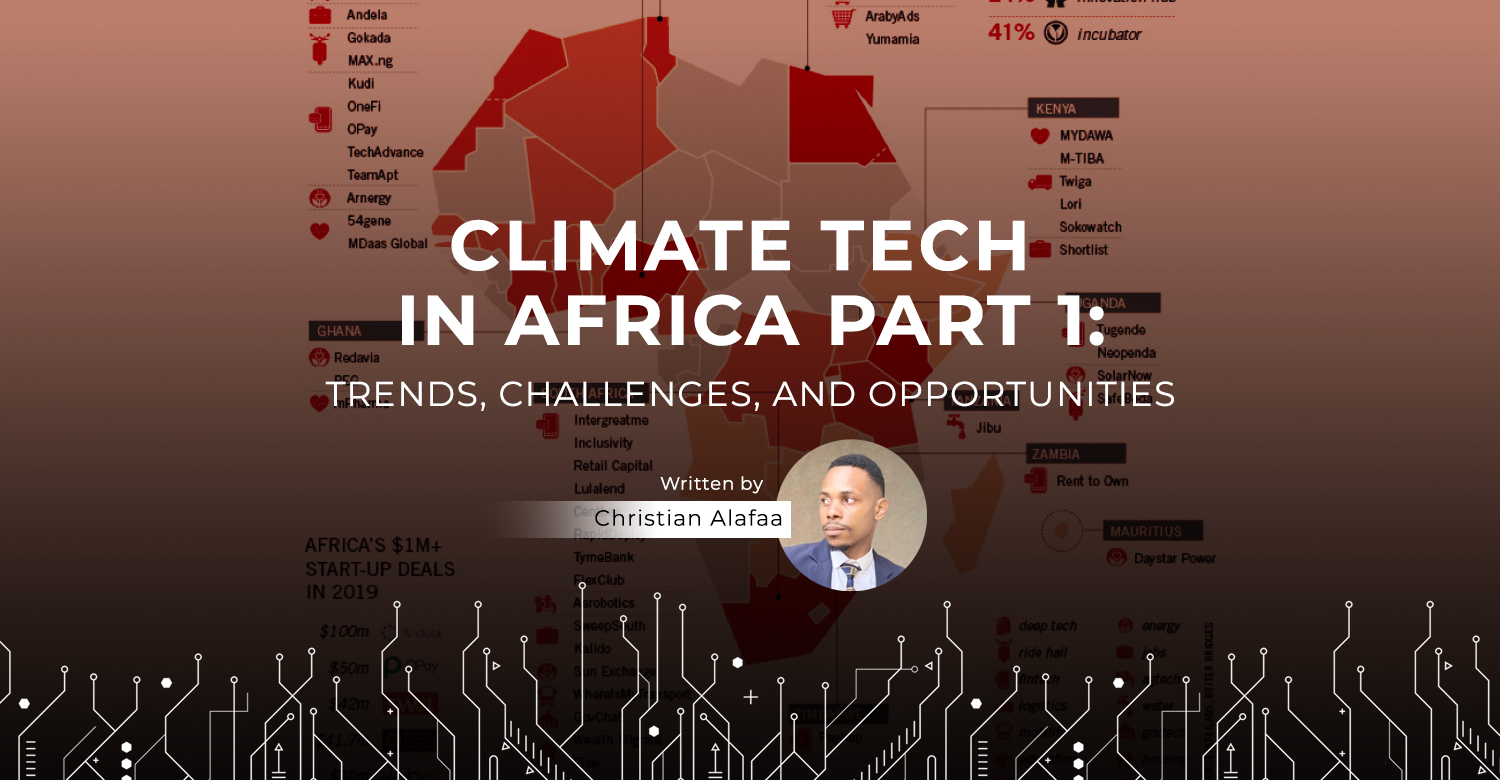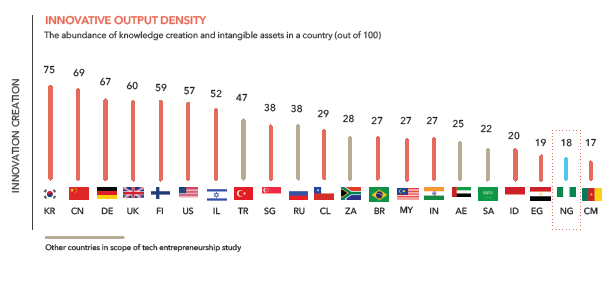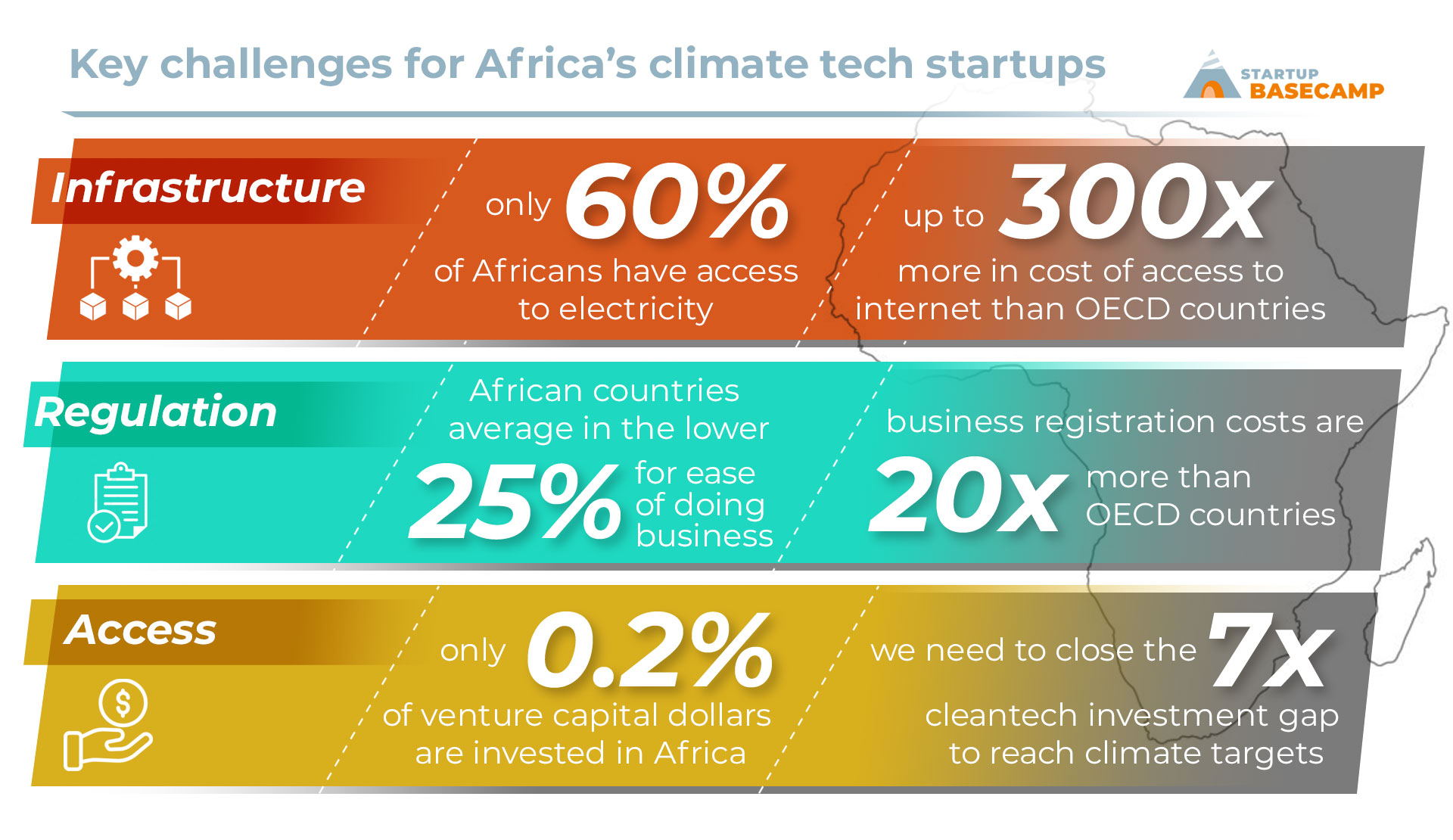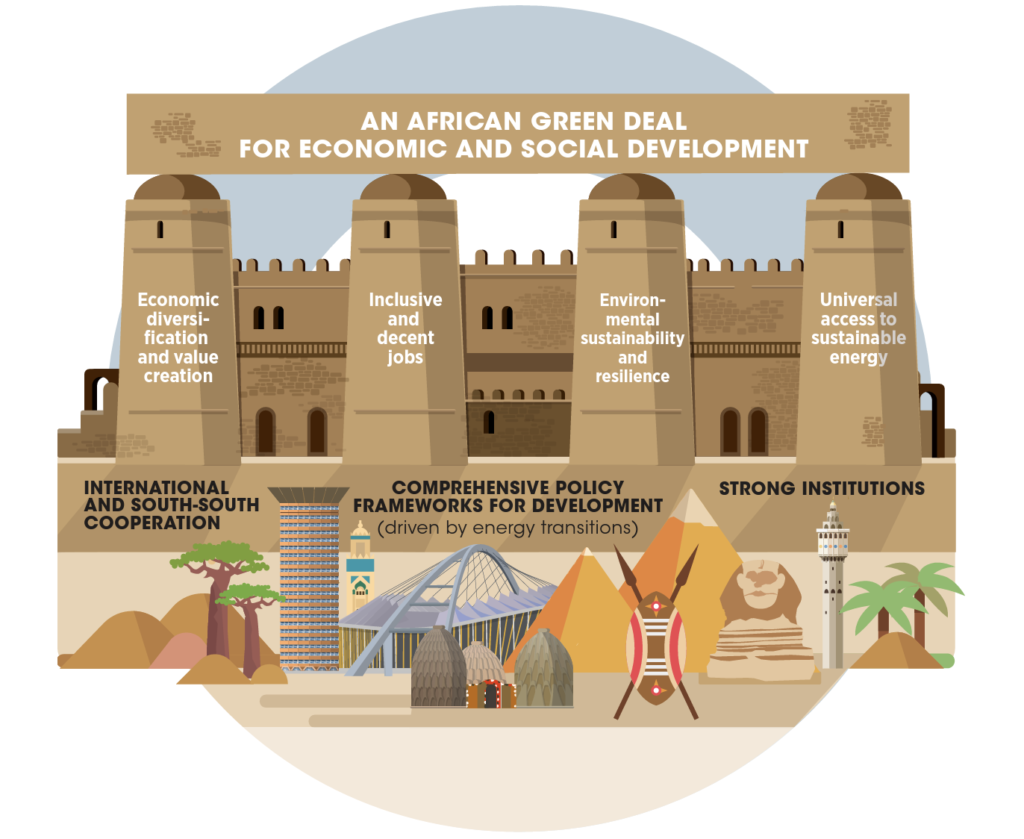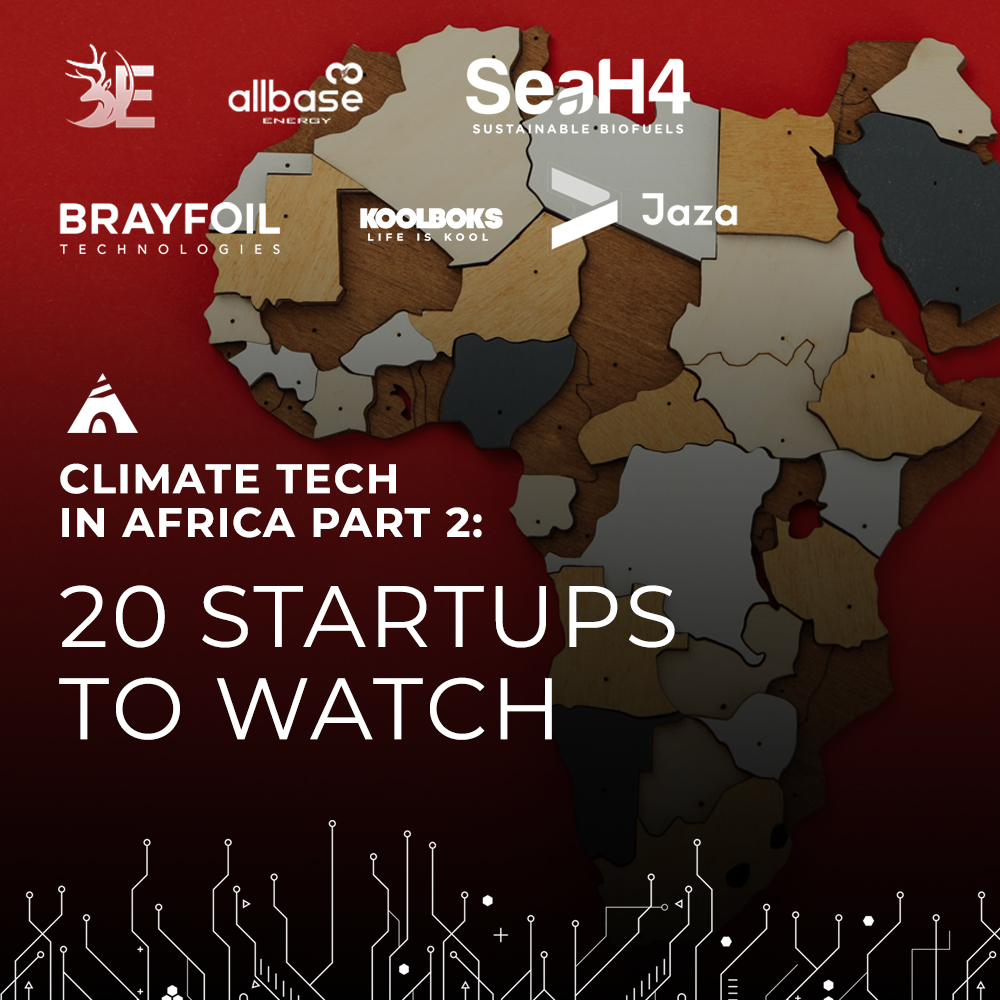The growth of climate tech development and deployment to mitigate the effects of climate change is critical for building resilient and sustainable societies. It is especially important in Africa, which is the most vulnerable region to climate change.
Despite the rising investment and capital flow in climate tech, African businesses lagged dramatically in 2020, garnering only 0.2 percent of the investment inflow, compared to over 93 percent in the US, Canada, Europe, and China.
Although Africa has the potential to embark on transformative green development pathways ranging from the high solar irradiation in the Sahel to the vast swaths of desert land being developed for green hydrogen, this can only be achieved by encouraging climate technology investment and entrepreneurship stimulation.
In this ongoing series, we aim to highlight the most fascinating climate tech companies across the continent, as well as the main tech hubs or innovation centers, the largest climate tech actors, and some of the region’s most pressing challenges and opportunities.
This first installment of the series will be in two parts: the first is an overview of the climate tech landscape in Africa, the second, 20 startups to watch across the continent.
Where are the main climate tech innovations happening?
In a joint report by Briter Bridges and AfriLabs, around 643 tech hubs were identified across Africa, ranging from incubators and accelerators to co-working sites.
Nigeria and South Africa continue to have the most advanced ecosystems, with over 80 active tech hubs and well-established collaboration and investment networks. Lagos is Africa’s most innovative city with over 40 hubs. The Western Cape, Gauteng, and, increasingly, Durban are at the heart of South Africa’s tech hub scene.
Egypt is positioned as the de facto node between the African and Middle Eastern ecosystems, ranking third only to Nigeria and South Africa. Its capital Cairo has grown to become one of the top three cities on the continent in terms of the number of hubs, trailing only Lagos and Cape Town. While Kenya, which has long been at the heart of East Africa’s tech ecosystem, has nearly 50 tech hubs making up the innovation quadrangle. Apart from these, Senegal has arguably the most developed startup ecosystem in Francophone Africa, as well as some of the continent’s fastest-growing ecosystems. Other non-capital cities are also seeing an increase in tech hubs, creating new breeding grounds for tech innovation.
What are the main challenges for climate tech innovation?
Climate tech startups in Africa operate in particularly difficult environments that drive up production costs and undermine competitiveness. As such, innovation on the continent faces significant challenges.
- Lack of infrastructure, such as efficient transport and access to energy, with irregular power supply and internet outages, stifles innovation in the region.
- The high cost of internet access and slow or unstable wireless access on the continent are significant barriers to innovation.
- Chronic power sector challenges, such as low electrification rates, high prices, and poor reliability, have had a significant impact on innovation in the region.
- A lack of adequate financing has hampered climate tech innovation in the region, particularly during the Covid pandemic, when funding fell by 8%. This drop in financing was exacerbated in 2020 when developed countries failed to meet the $100 billion climate finance target aimed at assisting emerging economies.
- Another significant challenge is convincing potential customers, particularly in rural areas, to switch from less sustainable products such as lump wood charcoal to more sustainable products such as clean cooking biogas.
- Climate tech startups face unfavorable regulatory frameworks in some African countries due to a lack of digital infrastructure and a digital skills gap, making it difficult to launch, grow, and scale.
- Another major challenge is the lack of connections between startups and the private and public sectors. Weak ecosystem connections jeopardize the support mechanisms that are critical in overcoming operational and strategic challenges.
Who are the main drivers of innovation?
Although climate tech has been identified as a future growth area, there are only a few tech centers and funds that significantly promote climate tech solutions in the region. These include;
- The Africa ClimAccelerator: The Africa ClimAccelerator is the first Pan-African climate accelerator focused on supporting the most promising climate impact ideas.
- The African Youth Climate Hub (AYCH): A Moroccan-based incubator for entrepreneurs from around the continent that gives answers to climate-related concerns.
- Novastar Ventures: Novastar Ventures was launched to be a part of and drive an entrepreneurial movement that is revolutionizing African markets and industries.
- The Climate Innovation Center South Africa: The Climate Innovation Center South Africa provides incubation services to small and medium enterprises that focus on creating innovative solutions to climate change challenges.
- E3 Capital: Energy Access Ventures (EAV) and Lion’s Head Global Partners partnered on a second Africa-focused venture capital fund focused on cleantech.
- GSMA Innovation Fund for Climate Resilience and Adaptation: The GSMA is looking for start-ups in Africa that leverage digital technology to deliver climate resilience and adaptation solutions.
- The Energy and Environment Partnership Trust Fund (EEP Africa): A clean energy financing facility that provides early-stage grants and catalytic debt financing for innovative clean energy projects.
- The GIZ Accelerator program for Climate Change Innovations supports early-stage companies in Benin, Cameroon, and Niger that deliver digital solutions to combat climate change.
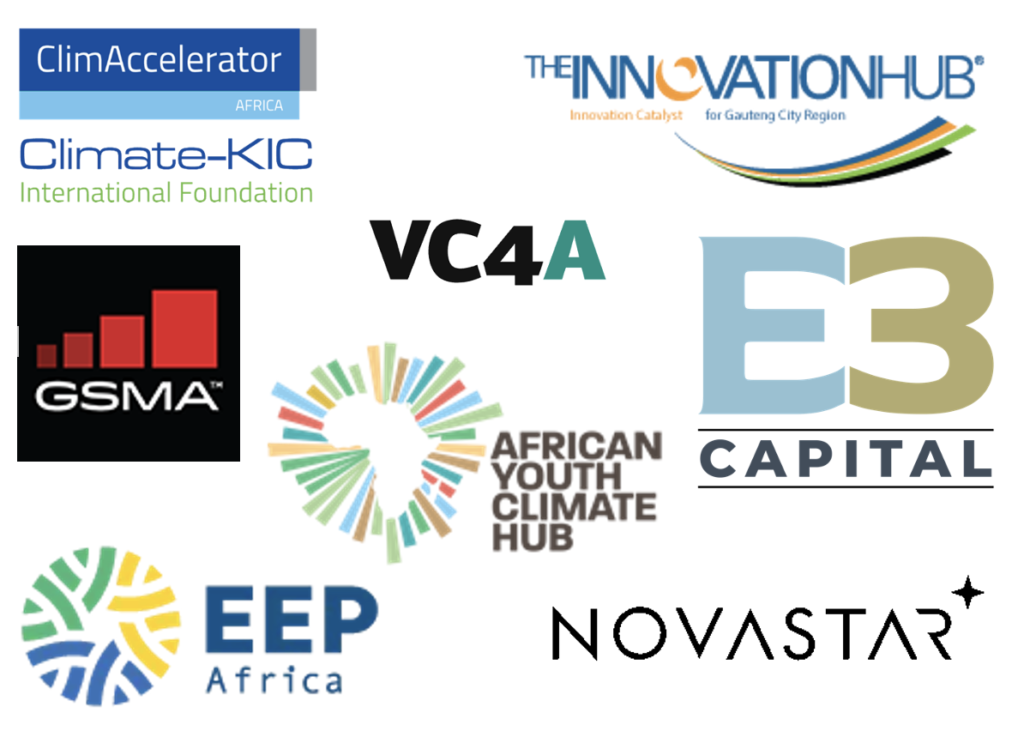
What are the main opportunities?
There are reasons to be optimistic about the future of climate technology in Africa. According to a 2020 report, many African countries are making concerted efforts to transition to low-carbon technologies, low-carbon and resilient infrastructure, and low-carbon tax systems. In many parts of Africa, the transition to a new climate economy is already underway:
- Recent renewable energy auctions in certain African nations, particularly South Africa, have resulted in solar and wind energy costs that are lower than those of national utilities or new coal plants.
- Over the last decade, the deployment of renewable energy across the continent has increased, with more than 26 GW of renewable-based power capacity installed.
- African governments must encourage reform in the state-owned enterprise sector. This could expose African institutions and markets to new clean-energy opportunities.
- Electrification projects must be made available to private sector investments and technology, such as solar energy and battery storage, allowing millions of impoverished and neglected households access.
- Due to an abundance of solar, wind, and geothermal resources, the continent’s renewable energy potential is limitless, and with green technologies becoming more affordable, there is an ideal opportunity to be on the receiving end of the new energy revolution.
What is next for Africa?
Although COP26 has left a sense of optimism for the innovation of climate technology in Africa. Driven by pledges to $100 billion in renewables and $2 billion in environmental conservation and food systems to help cut GHG emissions, build stronger communities and facilitate climate tech opportunity, Africa needs to strengthen the facilitation of ecosystem players to meet the demand of almost 8 billion people by 2050 while reaching net zero targets.
The sheer weight of population growth and pace of climate change requires Africa to reimagine climate tech agendas. This includes the need to strengthen climate tech policies by reducing policy barriers, facilitation of local investor ecosystems with improved finance mechanisms such as patient capital and to to build stronger tech ecosystems with hubs across the continent to utilize talent of local economies.
From founders, corporates to investors, African climate tech stakeholders must take action together to utilize this opportunity to not only alleviate climate mitigation across Africa but also to improve the livelihoods of every African.

About the Author
Christian Alafaa is a Frontend Engineer with Climate Mind and has a background in Marine Sciences. His work focuses on the intersection of climate and technology (software), working to help founders build sustainable tech by volunteering at climate-focused organizations, connecting under-represented climate tech founders with potential investors, and ensuring that businesses are able to effectively track their ESG strategies using authorized key performance indicators. He also runs a newsletter where he gets to speak with climate tech founders in Africa building sustainable solutions.
Check out part two:
20 Startups to Watch
Now that we have gotten an overview of the region, we look at 20 startups that are making a significant impact and working toward climate action across the continent.
